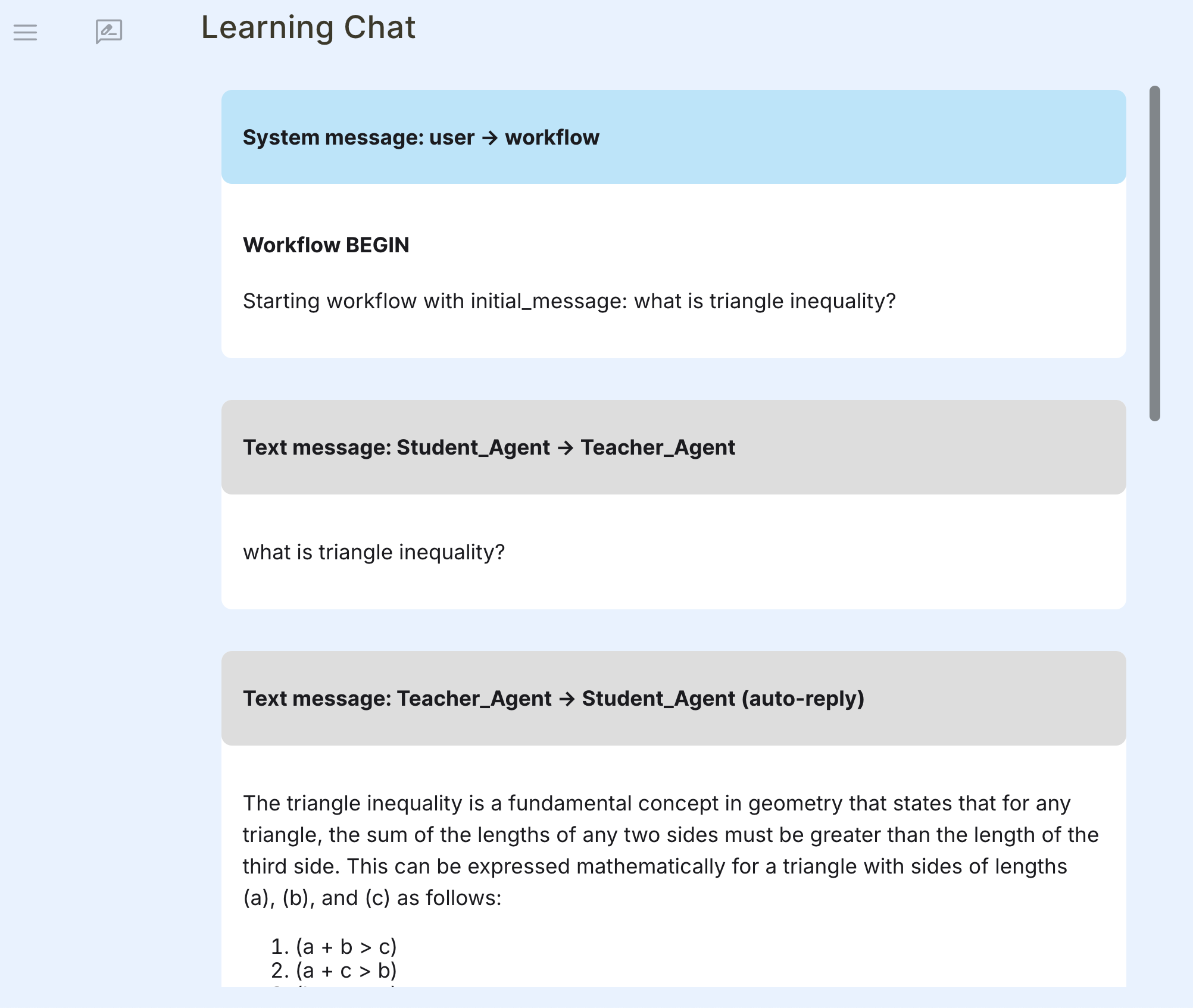The fastest way to bring multi-agent workflows to production
Project description
FastAgency
The fastest way to bring multi-agent workflows to production.
Welcome to FastAgency! This guide will walk you through the initial setup and usage of FastAgency, a powerful tool that leverages the AutoGen framework to quickly build applications. FastAgency is designed to be flexible and adaptable, and we plan to extend support to additional agentic frameworks such as CrewAI in the near future. This will provide even more options for defining workflows and integrating with various AI tools.
With FastAgency, you can create interactive applications using various interfaces such as a console or Mesop.
Supported Interfaces
FastAgency currently supports workflows defined using AutoGen and provides options for different types of applications:
- Console: Use the ConsoleUI interface for command-line based interaction. This is ideal for developing and testing workflows in a text-based environment.
- Mesop: Utilize Mesop with MesopUI for web-based applications. This interface is suitable for creating web applications with a user-friendly interface.
We are also working on adding support for other frameworks, such as CrewAI, to broaden the scope and capabilities of FastAgency. Stay tuned for updates on these integrations.
Quick start
Install
To get started, you need to install FastAgency. You can do this using pip, Python's package installer. This command installs FastAgency with support for the Mesop interface and AutoGen framework.
pip install "fastagency[autogen,mesop]"
Write Code
Imports
Depending on the interface you choose, you'll need to import different modules. These imports set up the necessary components for your application:
import os
from autogen.agentchat import ConversableAgent
from fastagency import UI, FastAgency, Workflows
from fastagency.runtime.autogen.base import AutoGenWorkflows
from fastagency.ui.mesop import MesopUI
Define Workflow
You need to define the workflow that your application will use. This is where you specify how the agents interact and what they do. Here's a simple example of a workflow definition:
llm_config = {
"config_list": [
{
"model": "gpt-4o-mini",
"api_key": os.getenv("OPENAI_API_KEY"),
}
],
"temperature": 0.0,
}
wf = AutoGenWorkflows()
@wf.register(name="simple_learning", description="Student and teacher learning chat")
def simple_workflow(
wf: Workflows, ui: UI, initial_message: str, session_id: str
) -> str:
student_agent = ConversableAgent(
name="Student_Agent",
system_message="You are a student willing to learn.",
llm_config=llm_config,
)
teacher_agent = ConversableAgent(
name="Teacher_Agent",
system_message="You are a math teacher.",
llm_config=llm_config,
)
chat_result = student_agent.initiate_chat(
teacher_agent,
message=initial_message,
summary_method="reflection_with_llm",
max_turns=3,
)
return chat_result.summary
This code snippet sets up a simple learning chat between a student and a teacher. You define the agents and how they should interact, specifying how the conversation should be summarized.
Define FastAgency Application
Next, define your FastAgency application. This ties together your workflow and the interface you chose:
app = FastAgency(wf=wf, ui=MesopUI(), title="Learning Chat")
Run Application
Once everything is set up, you can run your FastAgency application using the following command:
fastagency run
However, the preferred way of running Mesop application is a Python WSGI HTTP Server such as Gunicorn. First,
you need to install it using package manager such as pip:
pip install gunicorn
and then you can run it with:
gunicorn main:app
Output
[2024-10-01 16:18:59 +0000] [20390] [INFO] Starting gunicorn 23.0.0
[2024-10-01 16:18:59 +0000] [20390] [INFO] Listening at: http://127.0.0.1:8000 (20390)
[2024-10-01 16:18:59 +0000] [20390] [INFO] Using worker: sync
[2024-10-01 16:18:59 +0000] [20391] [INFO] Booting worker with pid: 20391
Future Plans
We are actively working on expanding FastAgency’s capabilities. In addition to supporting AutoGen, we plan to integrate support for other frameworks, such as CrewAI, to provide more flexibility and options for building applications. This will allow you to define workflows using a variety of frameworks and leverage their unique features and functionalities.
Stay in touch
Please show your support and stay in touch by:
-
giving our GitHub repository a star, and
-
joining our Discord server
Your support helps us to stay in touch with you and encourages us to continue developing and improving the framework. Thank you for your support!
Contributors
Thanks to all of these amazing people who made the project better!

Project details
Release history Release notifications | RSS feed
Download files
Download the file for your platform. If you're not sure which to choose, learn more about installing packages.
Source Distribution
Built Distribution
File details
Details for the file fastagency-0.2.0rc2.tar.gz.
File metadata
- Download URL: fastagency-0.2.0rc2.tar.gz
- Upload date:
- Size: 74.6 kB
- Tags: Source
- Uploaded using Trusted Publishing? Yes
- Uploaded via: twine/5.1.1 CPython/3.12.6
File hashes
| Algorithm | Hash digest | |
|---|---|---|
| SHA256 | 75b0e43f6819b5734580d02ac1f3ab3eb562238826bc9de4bf9729cecfd899f1 |
|
| MD5 | 48e2d3fc166d8748f53c8b0a92f106ae |
|
| BLAKE2b-256 | 092840bb9f566b7ae6d99a870af9b0edd89d95a837b02c1359704c6d9f09cf61 |
File details
Details for the file fastagency-0.2.0rc2-py3-none-any.whl.
File metadata
- Download URL: fastagency-0.2.0rc2-py3-none-any.whl
- Upload date:
- Size: 53.5 kB
- Tags: Python 3
- Uploaded using Trusted Publishing? Yes
- Uploaded via: twine/5.1.1 CPython/3.12.6
File hashes
| Algorithm | Hash digest | |
|---|---|---|
| SHA256 | a3929b964e016563ff3bbeac8be1758bca2e3c8d611442a56816b00863b99cd6 |
|
| MD5 | 4131fdffe2923ca8cd423e32f64d4c9c |
|
| BLAKE2b-256 | 1d2d5d1f7779ae8d71109181418b3c06341041b9818dcc67a765d97fe15de2fd |























